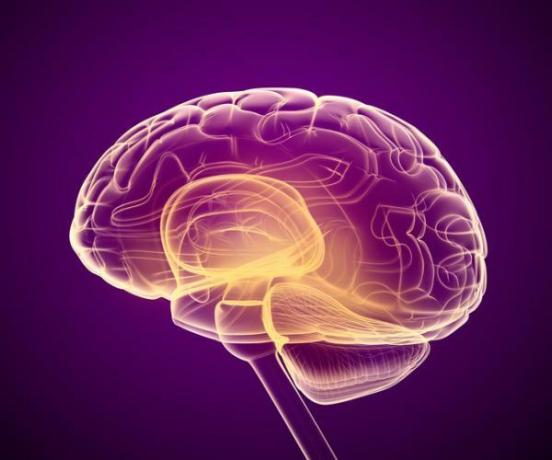
If you feel happy, you do not need to read this article, but if you feel that something is missing in your life, if you are not completely happy or feel very unhappy, please take a couple of minutes to read these ideas, which may open doors for you in the process of self-knowledge. I do not intend to theorize about the concept of happiness, I only propose to lead you to reflect on what prevents us, most of us, from being happy. Rather I ascribe to the definition of the Greek philosopher Socrates, who considers that the way to happiness is self-knowledge.
In this PsychologyOnline article, we try to answer the question of why can't we be happy.
Index
- Unhappiness acquired in childhood
- The "false happiness"
- Pribram's holographic brain theory
- Addicted to unhappiness
- Our worst enemy is ourselves
- Deep meditation to be happy
- How to overcome unhappiness addiction to be happy
Unhappiness acquired in childhood.
A few days ago I finished reading a book, which a student once gave me as a gift. I confess that I had leafed through it, and that I had read its first chapter, but had not advanced much further in reading it, despite its very suggestive title,
Apparently, when the book was given to me, I was not so unhappy, or at least, if I felt that way, I had not realized what being unhappy did in me. I am of the opinion that readings take on a special significance when one is sensitive to them, when one is vulnerable to the subject in question. To paraphrase an old Chinese proverb, when the disciple is ready, the teacher appears.
This book gave me a lot of light to analyze the problems that we face during life. The Pieper spouses are of the criterion that we have a series of behavior habits that prevent us from enjoying the life one wants (1). The origins of this, like most of the habits that shape our behavior, lie in the childhood. As children we assimilate the patterns of affective behavior that accompany us in adulthood and that are very difficult to modify, since they have an involuntary and automated nature. We are slaves to our habits, precisely because to carry them out we do not have to think about what we are doing, they speed up our lives. When a situation gets in the way of our behavioral stereotype, a load of anxiety ensues that makes us feel uncomfortable, annoyed, agitated. This is typical of addictive behavior, when something gets in the way.
Our parents try to educate us according to their concepts of authority and discipline, fully convinced that they are doing it for our good, in most cases. The child is born with a whole series of physiological needs such as breathing, drinking water, eating, eliminating waste, sleeping, etc. During the first months of life, other emotional needs arise, such as communication and acceptance, and other cognitive needs, such as curiosity about the world around them. A lot of these needs are frustrated by the prohibitions, punishments, threats, fears, that adults impose on the child, according to the educational models that they consider pertinent.
Parents are often unaware of these affective and cognitive needs of the child and they interpose their psychological ignorance to their satisfaction. The child interprets these emotional and cognitive deficiencies in terms of abandonment, guilt, lack of esteem, etc. This is wedged in his unconscious; only form of reflection in the first stage of life. Since the child's main need is to feel love from his parents, the connection is established at the unconscious, between what they are capable of giving you and the feeling of well-being, which later comes to define as happiness. For example, if we were children very punished, or very limited, we interpret in our infantile minds, that love is that. That is, if our parents punish us, or force us to do something we do not want, then, as they surely love us, that is love. Therefore, we feel "loved" in this way, leading to false happiness or false well-being.

The "false happiness"
This, in a general sense, makes us not achieve true happiness, but rather a false happiness, or a special kind of masochism, where we fall in love with the person who makes us suffer the most, despises us, abandons us or is unfaithful. However, the person who goes out of his way to protect us loves us, accepts us as we are, then becomes invisible to our eyes, or we find unacceptable defects, according to our seem. We just get “hooked”, like a drug addict, to suffering.
Sometimes things are going very well for us, we are about to achieve what we are looking for and, suddenly, a problem arises that makes us take three steps back, when we had advanced one. We justify this inconvenience and even feed it, because we need to feel that way unconsciously. Our thoughts become our worst enemies, because we begin to justify all inconveniences or obstacles to achieve what we want and even a secret magic happens around these events.
Holographic theory of the brain of Pribram.
Our thoughts, although we cannot see them, exist, they have an energy and a force, which are projected in the universe. Allow us a little digression. We will briefly refer to a very interesting theory about the functioning of the brain. According to Karl Pribram, a neurophysiologist at Stanford University and one of the most influential architects of the interpretation of the brain, the deep structure of the brain is essentially holographicIn other words, the brain is a hologram that interprets a holographic world. Holograms are three-dimensional images projected spatially with the help of a laser. This does not mean that the brain is made up of lasers, but rather that it has the properties of a hologram (2).
Pribram considers that the brain is, actually, a kind of lens, a transforming machine that converts the cascade of frequencies that we receive through the senses into the familiar realm of our internal perceptions. In other words, everything we perceive is about holograms created inside our minds, while what we call the "outside world" would be nothing more than a kaleidoscope of energy and vibration. Memory storage is not the only neurophysiological puzzle that is easier to tackle using Pribram's holographic model of the brain. In this way, the brain manages to translate the avalanche of frequencies received through the senses (light, sound frequencies, etc.) until they are transformed into familiar perceptions sensory.
That projected energy makes certain events or other energies join it. It is as if it were a telephone, that you dial a number and the other side answered you, from the number you have dialed. More or less, like the idea that God hears our prayers. It is a physical phenomenon, or metaphysical if you will, but a real, objective one. That is why the universe or that energy that inhabits another dimension that is not what we see, connects with what we think, a magnetic attraction occurs. It is as if the universe pleases us, or responds to our "call."
We may not be aware that the thoughts we project are addictive to unhappiness. The "phone number" that we have in our brain "file" is that of unhappiness. We consciously think that we seek happiness, that we want to be happy, but what we have is an idea distorted happiness, it is a false happiness, it is a sado-masochistic happiness, the result of our experiences children. That is, we consciously seek happiness, but unconsciously, we need a certain degree of discomfort to maintain our inner balance.

Addicted to unhappiness.
The Pieper professors define true satisfaction as the inner, well-founded certainty that one is affectionate and worthy of affection, and that we choose for our life, that which is constructive and appropriate. True satisfaction makes life always better, never harmful, not for oneself or for others. That there are ungrateful people, there are, who try to hurt us, but we will decide to turn away from them, in the name of happiness, because we do not deserve them and we will not seek them. Only the addiction to unhappiness would lead us to remain hooked with those people who violate us, who despise us, or who want to abandon us.
For this reason, when we are about to get things, wham, they evaporate between our hands, because a unforeseen event that spoils our plans (an illness, a refusal, a loss and even a phenomenon atmospheric). This is because from our unconscious that happiness seems unattainable to us.
They made us believe, while we were children, that by "misbehaving" (deep down all we wanted was satisfy our natural needs for curiosity, affection, physiological, etc.), we deserved a punishment. How many times did they force us to do something we didn't like (do our homework, throw out the trash, fix our room, etc.), so that they would let us play, go for a walk, watch TV, etc.! Not that we should be allowed to do whatever we want. On the contrary, it was about teaching us to understand our needs, to learn how to prioritize them or satisfy them at the most convenient moment, with joy and not, necessarily link them to rewards and punishments (it is also very common in the religious sphere to see happiness as a reward, if we comply with the precepts established). Our parents showed us a list of duties, which had nothing to do with the needs of a child (they force us to be adults before their time), as a synonym of behaving well, and that only in this way, we would obtain their long-awaited approval and with it, their affected.
This is how one becomes a addicted to unhappiness, to suffering, to resignation, to frustration. When we are well, we "fall from the sky" problems. I say "fall" because we begin to give ourselves justifications for why we should assume this or that. Instead of considering other alternatives that do not involve giving up what we must do, we allow ourselves to be carried away by rigid moral codes of what is right or wrong. For example, I give up getting married or going to work elsewhere, not to leave my mother alone. So if I do the opposite, they can brand me as selfish. If I am selfish, I feel guilty. If I am guilty, then I will not be able to be calm wherever I go. So, I better stay, I sacrifice myself, I spend my whole life dreaming of a happiness that does not come and that when my mother is gone, then I will be too old to take something and I will die very frustrated, but deep down, with an overdose of "the cocaine of unhappiness", just as most addicts die, "happy". It is not a matter of abandoning mother to her fate, but rather of considering other alternatives so that she is well cared for, without requiring our direct presence.
Our worst enemy is ourselves.
We must recognize those sabotaging mechanisms of our conscious mind, because the main enemies in this war are ourselves. The weapons we use against ourselves are a string of moralistic, slick, puritanical, benefactor, sweetener, hypocritical justifications that They become “masked men”, forgetting our true face (our individual needs), according to the Lebanese poet Kalil Gibran. We forget to satisfy our needs in an act of "detachment" and compassionate sacrifice, when in reality it is nothing more than an act of addiction to gratuitous unhappiness.
Since we were children we were told that seeking our satisfaction was being selfish. We were told that sacrificing for others was a highly valued duty. That being honest with ourselves was wrong, because we didn't really know what we wanted. Only parents or adults could know our needs. I remember when as a child, I went to eat at a restaurant with my parents and another family. I was barely 5 or 6 years old and I didn't want to eat what they served us and I started to freak out. Today I don't know if it was because I didn't like the food, or because I wasn't hungry at the time, but my father got very angry and even spanked me. How does the infant mind interpret that... Something like: "We must not pay attention to our needs, we must please others, so that they are happy with one"... That is what the infant mind begins to encode as convenient. And that, over and over again, becomes a habit. We already know how difficult habits are to eliminate. It is as if, being left-handed, you had to eat, write, brush your teeth with your right hand, quickly and perfectly. You will feel very uncomfortable, despair and even frustrated when you see the mistakes you make.

Deep meditation to be happy.
You have to do a very intense and deep meditation process to discover the roots of our conditioning to unhappiness. New connections must be made to break old habits.
The first thing to do, to create new connections, is to repeat yourself, several times a day, as if it were a prayer or prayer, which we were born perfect beings, with a peculiar nature that is given to us at birth. It is not our fault that our parents wanted a different person for their child. We are not guilty of anything. We deserve love and that love is synonymous with protection, respect, acceptance, affection. We should not feel guilty about anything, or ashamed of anything. We can receive love without conditions, and we can also give it without limitations (3).
That must be repeated a thousand times. When you go to bed, when you get up, whenever an idea comes to you that worries or discourages you. At first it is hard work, but remember that to break a habit, nothing is better than breaking the chain of conditioning, learning a new chain. If an oxidized, corroded chain is replaced by another made of pure, shiny gold, it will be very advantageous for us, because we will no longer look so ugly, but we will also shine with that new garment. It is like seeing two people, one poorly dressed and dirty and the other elegant and perfumed. The best opportunities will come to the person with good presence, by law of attraction.
When we are addicted to unhappiness, we are like that disheveled and obnoxious person, whom no one wants to approach, because he only knows how to talk about misfortunes and grief. The Universe answers our call. If we call the Unhappiness number, Happiness cannot answer us. Conversely, when we are satisfied, we know what we wantWe are confident in our resources and defend our needs, we are that beautiful person whom everyone admires and respects.
How to overcome the addiction to unhappiness to be happy.
You may have noticed that most of us are, or have been, addicted to unhappiness. If you have read this far, you will be asking the question of how to beat this peculiar addiction. The first thing to do is convince ourselves that we are addicts. The second is to have a perception of the consequences of that addiction on our health. Perceiving risk is identifying the threats to mental and physical health caused by a certain behavior. If we are convinced that the bad habit of sabotaging true happiness is related to depression or Any other disease, we must learn to recognize the danger signs and avoid them by all means.
To break a habit, simply break a link in the chain of operations that make it up. If we are obsessed with the person who exercises any type of violence against us, or simply that he no longer loves us, we must be aware that this is the stimulus that unleashes the chain of suffering. It is necessary reprogram our behavior, free from these threats.
In order to reschedule, we must delve into our childhood experiences. You will surely find memories, images, that will lead you to evoke almost faithfully what is happening in your life today. The past holds the key to understanding us, if we want to live a different present. To understand what you are wondering today, for example, why your partner has abandoned you, why you have a boss who overloads you and does not recognize you your effort, why you have a disloyal friend, or why you feel so lonely, you should do a self-analysis process and look for many of these answers in your childhood. It is very likely that he is reproducing behavior patterns from that stage. Abandon "masks", defense mechanisms or justifications. Don't fool yourself, be honest with yourself.
If we fail to be kind to ourselves, we will be feeding the enemy within us. Becoming kinder to yourself, means being more harmonious with our nature, that is, recognizing our true needs and working according to their satisfaction. True satisfaction always makes life better. So you can be happy and make others happy. Existence is lavish with you and gives you exactly what you need. You just have to "dial the correct phone number".

This article is merely informative, in Psychology-Online we do not have the power to make a diagnosis or recommend a treatment. We invite you to go to a psychologist to treat your particular case.
If you want to read more articles similar to Why can't we be happy?, we recommend that you enter our category of Personal growth and self-help.
References
- Heinerman Pieper M, and W.J. Pieper: Addicts to unhappiness: Editorial Círculo de Lectores, Bogotá D.C., 2004.
- Fredy H. Wompner G. "Holistic intelligence for the XXI century", OSORNO- CHILE, 2008, Intellectual Property Registry Nº 174731 Communication with the author: [email protected]
- Ramtha: The mystery of love. Limitless, 2001 http://www.sinlimites.net


